Manderlay - Movie Review
 Manderlay 2006
Manderlay 2006“Manderlay” tells a charming tale of a gangster’s daughter on the lam in Depression Era America who stumbles upon a plantation in the Deep South where she is shocked to find the existence of slaves. Being that slavery officially ended seventy years prior to her discovery, she is a bit taken aback to say the least. She confronts the dying matriarch who owns the plantation, and after her demise takes it upon herself to educate the slaves about their right to freedom, and to teach the former white overseers a lesson or two about bigotry.
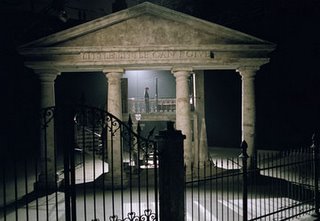
As you may have probably heard by now, “Manderlay” is the brainchild of the famed enfant terrible of European cinema and one of the founders of the influential “Dogme 95” movement, Lars von Trier. In his second installment of a planned trilogy examining the moral sins of the United States, Danish filmmaker von Trier has come under incredible scrutiny and vitriolic criticisms, mainly from American critics, as to his veracity and intent. We ourselves have been alternately entranced, shocked, repelled and hypnotized by von Trier’s work, and his latest is no exception in any category.
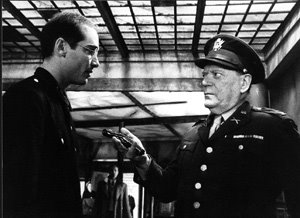 When von Trier burst upon the international scene with his virtuoso “Zentropa (Europa)” we fell head over heels in love with his brazen technique, control of the medium and sheer audacity. We were not the only ones. Critics and filmmakers joined in the collective praise, culminating in three top prizes at the Cannes Film Festival. Even the epitome of the Hollywood director, Steven Spielberg was reported to have offered von Trier immediate work in the States, only to be turned down. Cheeky Dane! When it came time for Spielberg’s magnum opus, “Schindler’s List” many insiders noted the striking similarities in tone and feel to von Trier’s early masterpiece. Hmmmmmmm.
When von Trier burst upon the international scene with his virtuoso “Zentropa (Europa)” we fell head over heels in love with his brazen technique, control of the medium and sheer audacity. We were not the only ones. Critics and filmmakers joined in the collective praise, culminating in three top prizes at the Cannes Film Festival. Even the epitome of the Hollywood director, Steven Spielberg was reported to have offered von Trier immediate work in the States, only to be turned down. Cheeky Dane! When it came time for Spielberg’s magnum opus, “Schindler’s List” many insiders noted the striking similarities in tone and feel to von Trier’s early masterpiece. Hmmmmmmm.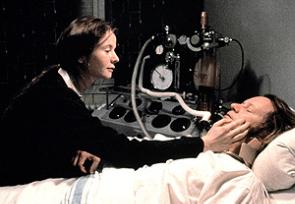
After busying himself with breakthrough television work in his native country, von Trier delivered another success d’estime with “Breaking the Waves”. We were mesmerized and horrified at this ruthless religious parable that while providing a star making turn for Academy Award nominated Emily Watson, also managed to depict the systematic and apparently unnecessary degradation of a faithful wife to her bedridden husband’s whims. The surrealistic ending which somehow seems to substantiate her emotional torture and physical pain with the notion that it was indeed “God’s will”, left us shell shocked and screaming “Misogynist Bastard!” at the empty screen. It would be a rallying cry we would shout from the rafters following his next major film – “Dancer in the Dark”.
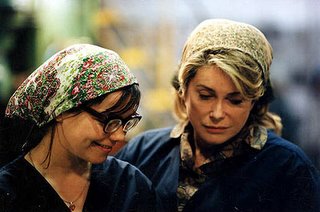 We found both “Breaking the Waves” and “Dancer in the Dark” to be so blatantly vicious in the depictions of their heroines’ suffering, that it bordered on viewing Snuff Films. It became quite clear that von Trier had several issues to work out regarding his viewpoint of women. When “Dogville” was released in 2003, we were at first anxious to see the all star cast he had lined up headlined by the star of the moment herself, Nicole Kidman. Then we read the plot description.
We found both “Breaking the Waves” and “Dancer in the Dark” to be so blatantly vicious in the depictions of their heroines’ suffering, that it bordered on viewing Snuff Films. It became quite clear that von Trier had several issues to work out regarding his viewpoint of women. When “Dogville” was released in 2003, we were at first anxious to see the all star cast he had lined up headlined by the star of the moment herself, Nicole Kidman. Then we read the plot description. A young woman wanders into a small town in America and becomes enslaved to their populace, ultimately beaten, raped and degraded in the name of community law. We stayed away. For two years. It slowly began to gnaw at our backsides like a hopped up horse fly, until we finally relented and rented the DVD. We could not have been more wrong. We were overwhelmed again by the audacity, and actually fell hook, line and heroine-beating-sinker for the Brechtian inspired morality play, which managed to throw in the bare bones staging concepts of Thornton Wilder’s “Our Town” and pulled off a cinematic coup. Critics raved and audiences stayed away in droves. Typical.
A young woman wanders into a small town in America and becomes enslaved to their populace, ultimately beaten, raped and degraded in the name of community law. We stayed away. For two years. It slowly began to gnaw at our backsides like a hopped up horse fly, until we finally relented and rented the DVD. We could not have been more wrong. We were overwhelmed again by the audacity, and actually fell hook, line and heroine-beating-sinker for the Brechtian inspired morality play, which managed to throw in the bare bones staging concepts of Thornton Wilder’s “Our Town” and pulled off a cinematic coup. Critics raved and audiences stayed away in droves. Typical.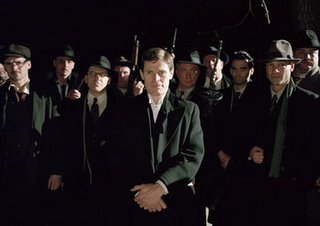 The filming of “Dogville” was famously a trial for all concerned, even resulting in a “Dogville Confessions” - an on set confessional booth wherein actors and crew members could air their grievances. When it came time to film the second part of his planned trilogy, Nicole Kidman was no longer available due to "scheduling conflicts". In came Bryce Dallas Howard, Opie’s talented daughter. James Caan, the original creator of Grace’s father was out too, so in stepped Willem Dafoe. Several cast members of “Dogville” return, but in different roles. (If you’ve seen “Dogville” you know why they couldn’t quite reprise their original characters.)
The filming of “Dogville” was famously a trial for all concerned, even resulting in a “Dogville Confessions” - an on set confessional booth wherein actors and crew members could air their grievances. When it came time to film the second part of his planned trilogy, Nicole Kidman was no longer available due to "scheduling conflicts". In came Bryce Dallas Howard, Opie’s talented daughter. James Caan, the original creator of Grace’s father was out too, so in stepped Willem Dafoe. Several cast members of “Dogville” return, but in different roles. (If you’ve seen “Dogville” you know why they couldn’t quite reprise their original characters.)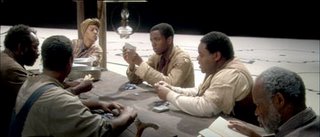 While we are on record as having disliked the watered down “discussion” of race in this year’s overly Oscar nominated “Crash” – we find that perhaps that film’s popularity and bizarrely rich critical praise speaks volumes about what Americans are willing to view when it comes to cinematic portrayals of racism. While Oscar loves a schmaltzy gander at race – “Guess Who’s Coming to Dinner” anyone? – we know in our hearts and especially our minds that this country is incredibly uncomfortable when it must face it’s own history of race relations. When Grace first encounters the denizens of Manderlay, and decides to stay and attempt to help them, her father tries to dissuade her. She responds by quietly informing him that since they are responsible for creating slavery, they should be responsible in assisting these time lost souls. The sentiment is noble. Her subsequent actions border on the ridiculous.
While we are on record as having disliked the watered down “discussion” of race in this year’s overly Oscar nominated “Crash” – we find that perhaps that film’s popularity and bizarrely rich critical praise speaks volumes about what Americans are willing to view when it comes to cinematic portrayals of racism. While Oscar loves a schmaltzy gander at race – “Guess Who’s Coming to Dinner” anyone? – we know in our hearts and especially our minds that this country is incredibly uncomfortable when it must face it’s own history of race relations. When Grace first encounters the denizens of Manderlay, and decides to stay and attempt to help them, her father tries to dissuade her. She responds by quietly informing him that since they are responsible for creating slavery, they should be responsible in assisting these time lost souls. The sentiment is noble. Her subsequent actions border on the ridiculous.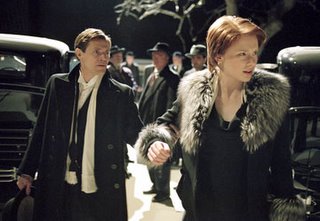 Grace attempts to enslave the white overseers and educate the slaves into the concepts of law and justice. Her ultimate failure is apparent from the start, but the journey we take as filmgoers is the real question here. Is the film able to sustain us dramatically for its morality tale? For us, the film succeeds with the power of its conviction and the daring of its scope. This is not a modern day apologia for slavery. It attempts to examine the thinking behind the process, and in fits and starts it succeeds. We will admit that the first third is less than dynamic, and ultimately the film succeeds on the capable skills of its very talented cast.
Grace attempts to enslave the white overseers and educate the slaves into the concepts of law and justice. Her ultimate failure is apparent from the start, but the journey we take as filmgoers is the real question here. Is the film able to sustain us dramatically for its morality tale? For us, the film succeeds with the power of its conviction and the daring of its scope. This is not a modern day apologia for slavery. It attempts to examine the thinking behind the process, and in fits and starts it succeeds. We will admit that the first third is less than dynamic, and ultimately the film succeeds on the capable skills of its very talented cast. Bryce Dallas Howard and Willem Dafoe suffer slightly in comparison to the work done by Nicole Kidman and James Caan, but they do not disappoint. When we first viewed “Dogville” we thought, what a perfect name for Nicole’s character. Her innate “grace” and delicate beauty made her predicament all the more tragic and touching for the viewer. Not that she coasted by merely on her looks – it was a perfect combination of actress and role. Miss Howard bravely attempts to fill her period shoes, and in several scenes nails the role perfectly. It is perhaps more of a lingering memory of her predecessor that irked us throughout.
Bryce Dallas Howard and Willem Dafoe suffer slightly in comparison to the work done by Nicole Kidman and James Caan, but they do not disappoint. When we first viewed “Dogville” we thought, what a perfect name for Nicole’s character. Her innate “grace” and delicate beauty made her predicament all the more tragic and touching for the viewer. Not that she coasted by merely on her looks – it was a perfect combination of actress and role. Miss Howard bravely attempts to fill her period shoes, and in several scenes nails the role perfectly. It is perhaps more of a lingering memory of her predecessor that irked us throughout.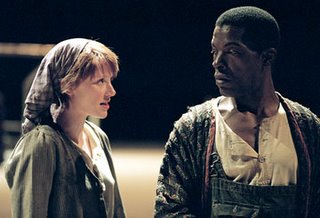 The real acting success in this film belongs to Isaach De Bankolé as the proud Timothy, whose cool stare cuts thru any of the outer trappings and draws you in completely. Danny Glover does a fine turn as the former house slave, whose influence over his brethren is quietly integral to the ultimate tragedy. And as the elderly Wilma, one Mona Hammond elicits the real emotion to be found in this piece. She is truly effective in her key scenes.
The real acting success in this film belongs to Isaach De Bankolé as the proud Timothy, whose cool stare cuts thru any of the outer trappings and draws you in completely. Danny Glover does a fine turn as the former house slave, whose influence over his brethren is quietly integral to the ultimate tragedy. And as the elderly Wilma, one Mona Hammond elicits the real emotion to be found in this piece. She is truly effective in her key scenes. By the time the end credits role, echoing the Depression Era montage of the original by a rapid succession of images of racial inequality in this country – all set to the jaunty tune of David Bowie’s “Young Americans”, you feel more than a bit pummeled over the head. But the secret to the success of this film for us, was precisely in those closing shots. Sitting there, watching images of lynchings past and present, the famed Rodney King beatings, and several iconic Civil Rights Era photos – we couldn’t help but wonder. Has this country even yet begun to address the wrongs they bestowed upon African Americans? If a black man can get beaten near to death, dragged behind a pick up truck until he is beheaded – and little is done to right that wrong in present day America, when will the real conversation even start? Hopefully the next major film to address racial issues in this country will not be voiced by Sandra Bullock and Thandie Newton.
By the time the end credits role, echoing the Depression Era montage of the original by a rapid succession of images of racial inequality in this country – all set to the jaunty tune of David Bowie’s “Young Americans”, you feel more than a bit pummeled over the head. But the secret to the success of this film for us, was precisely in those closing shots. Sitting there, watching images of lynchings past and present, the famed Rodney King beatings, and several iconic Civil Rights Era photos – we couldn’t help but wonder. Has this country even yet begun to address the wrongs they bestowed upon African Americans? If a black man can get beaten near to death, dragged behind a pick up truck until he is beheaded – and little is done to right that wrong in present day America, when will the real conversation even start? Hopefully the next major film to address racial issues in this country will not be voiced by Sandra Bullock and Thandie Newton.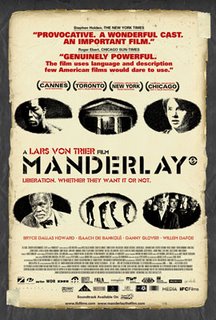 Written & Directed by Lars von Trier
Written & Directed by Lars von TrierStarring
Bryce Dallas Howard as Grace Margaret Mulligan
Isaach De Bankolé as Timothy
Danny Glover as Wilhelm
Willem Dafoe as Grace’s Father
Jeremy Davies as Niels
Lauren Bacall as Mam
Chloë Sevigny as Philomena
Jean-Marc Barr as Mr. Robinsson
Udo Kier as Mr. Kirspe
Suzette Llewellyn as Flora
Mona Hammond as Old Wilma
Zeljko Ivanek as Dr. Hector
John Hurt as the Narrator
Cinematography by Anthony Dod Mantle
Film Editing by Bodil Kjærhauge & Molly Marlene Stensgård
Costume Design by Manon Rasmussen
Original Music by Joachim Holbek
Art Direction by Peter Grant
Set Decoration by Simone Grau


0 Comments:
Post a Comment
<< Home